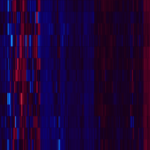Lien vers Pubmed [PMID] – 29038595
Lien DOI – 10.1038/ng.3975
Nat Genet 2017 Dec; 49(12): 1789-1795
Testing for associations in big data faces the problem of multiple comparisons, wherein true signals are difficult to detect on the background of all associations queried. This difficulty is particularly salient in human genetic association studies, in which phenotypic variation is often driven by numerous variants of small effect. The current strategy to improve power to identify these weak associations consists of applying standard marginal statistical approaches and increasing study sample sizes. Although successful, this approach does not leverage the environmental and genetic factors shared among the multiple phenotypes collected in contemporary cohorts. Here we developed covariates for multiphenotype studies (CMS), an approach that improves power when correlated phenotypes are measured on the same samples. Our analyses of real and simulated data provide direct evidence that correlated phenotypes can be used to achieve increases in power to levels often surpassing the power gained by a twofold increase in sample size.




